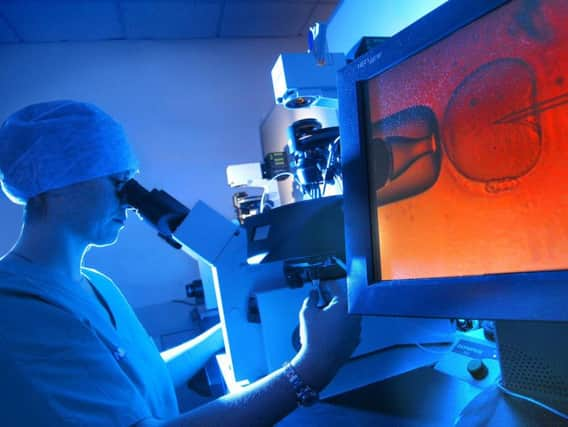Wigan women lose out in IVF postcode lottery


National guidance is that three cycles should be offered to eligible women under 40, but only two are available in the borough.
The figures, released during National Fertility Awareness Week by campaign group Fertility Fairness, show just 12 per cent of clinical commissioning groups (CCGs) now follow national guidance, down from 24 per cent in 2013.
Advertisement
Hide AdAdvertisement
Hide AdDr Tim Dalton, a GP and chairman of NHS Wigan Borough CCG, said: “We recognise the importance of IVF treatment for those families that have found it difficult to conceive naturally.
“Whilst we aren’t one of the seven CCGs that fund three cycles of IVF, by offering two cycles for women under 40 and one cycle for women 40-42, we do fund more than the majority.
“The number of cycles we offer has not changed in recent years. Most women have a 20 to 35 per cent chance of getting pregnant per IVF cycle, but the chance decreases with each cycle. We believe that two cycles of IVF is the right balance between offering fair access to treatment and cost effectiveness in the current financially challenging climate.”
Fertility Fairness’ 2017 audit revealed the number of CCGs offering just one NHS-funded IVF cycle has leapt to 61 per cent, from 49 per cent in 2013, and seven CCGs have removed NHS IVF (3.4 per cent).
Advertisement
Hide AdAdvertisement
Hide AdThe 208 CCGs in the audit have been ranked for the first time in 17 positions, with Wigan at number five.
The top four areas in England for IVF are all in Greater Manchester - Bury; Heywood, Middleton and Rochdale; Tameside and Glossop; and Oldham.
Susan Seenan, co-chairman of Fertility Fairness, said: ‘This National Fertility Awareness Week we are commemorating 40 years of IVF, 40 years of a life-changing technology pioneered in England.
“That achievement means nothing if only those who can afford private IVF benefit. The Government should be ashamed that, after 40 years of IVF, it is your postcode and your pay packet, and not your medical need, which are the key determinants of whether you will be able to try IVF.”